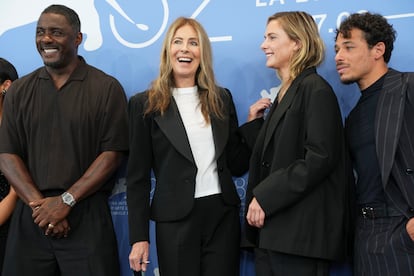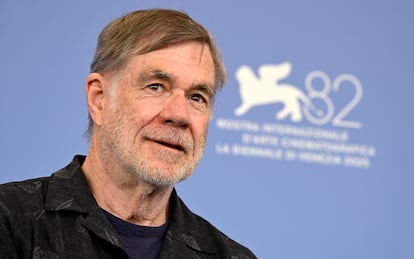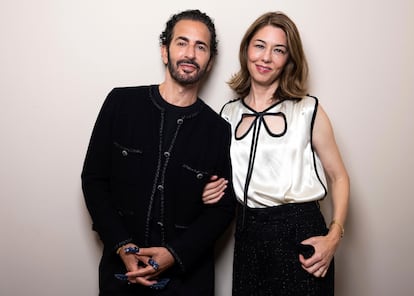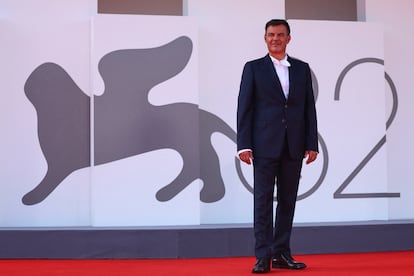Kathryn Bigelow raises nuclear alert at the Venice Film Festival

There's never time to waste at the Venice Film Festival . The program is brimming with fascinating films, many overlapping, and you have to choose. The worst mistake, of course, is missing out on a masterpiece. A shame, but manageable for the planet. On the Mostra screen this Tuesday, however, momentous decisions were being made. And with even less time: just 19 minutes until a nuclear missile destroys Chicago . The entire US chain of command knows the emergency protocol by heart, but this time the threat is real. They must decide against the clock: wait or retaliation, prudence or atomic apocalypse. Technicians, officials, secretaries, and the president himself weigh the options to save the world. And, at the same time, each to his own: even in the midst of such chaos, people find time to call home.
With all this, A House of Dynamite, Kathryn Bigelow 's film return, had a resounding impact on the festival: it took eight years to arrive, but it brought a bang. It didn't leave any cinematic doubts, but rather existential ones. There are already a few feature films that highlight human stupidity. It's enough to give it some thought. Or to make us look at it.
“I grew up in an era where hiding under your desk was the protocol for surviving a nuclear attack. That's how it was immediately perceived. Since then, the threat has only escalated, yet it has all but disappeared from public consciousness. Several nations possess arsenals sufficient to wipe out civilization in minutes, but there's a certain numbness,” the director said in Venice. Perhaps her film, which will have a limited theatrical release and will be available on Netflix on October 24, will change some of that perception.
Because the film is based on visits to government agencies, interviews with experts, and journalistic investigation. Idris Elba , who plays the president, described the shoot as "being in a documentary." And what they discovered frightened even screenwriter Noah Oppenheim: the actual probability of stopping such an attack in flight is around 60%. "A damn toss-up," the film says. "Like hitting one bullet with another," an agent says on screen. Imagining that the final word on all this would fall to Donald Trump offers no relief.

But Bigelow has never wanted her audience to be comfortable. On the contrary, few filmmakers handle the thriller like she does. Her entire filmography should be prescribed to those who still believe that cinematic adrenaline is reserved for men. Another, perhaps incurable, imbecility at this point. The expectation surrounding A House of Dynamite explains the prestige the creator has earned. Venice, moreover, is especially familiar with her: she has premiered almost all of her features there. And she has displayed that mix of talent, tension, rigor, subtext, denunciation, politics, and humanity that elevated her to become the first woman in history to win the Oscar for Best Director, in 2009 with The Hurt Locker , about an elite bomb disposal expert in Iraq . With Zero Dark Thirty, she filmed the long US hunt for Bin Laden. And, if possible, she surpassed herself. Her last feature to date, Detroit , recounted a savage police intervention in 1967 that ended with three officers prosecuted for the murder of protesters. Bigelow shakes viewers and the foundations of the system alike.
And he does it again with his latest film. One audience member confessed that she was still trembling after the screening. A frenetic pace, harsh realism, but with emotional touches: the audience is soon seated in the middle of a crisis committee. Although what's really being discussed there is only the dead end: the only option is "surrender or suicide," as they propose to the president. The film serves to ask how the world got itself into this mess. And whether it might be time to back down, before it's too late. "How can annihilating the planet be a good defensive measure?" Bigelow asked.

“It’s a miracle, frankly, that something horrific hasn’t happened yet. Many of these weapons are ready to fire, and in countries like ours, an individual, the president, with his sole authority, authorizes their use,” Oppenheim added. The writer explained that A House of Dynamite isn’t tied to this historical and geopolitical moment, but to the nuclear debate in general . It remains to be seen whether the conversation about it will be revived in time. Meanwhile, Bigelow has returned. And that’s no small feat. To applause from the press room, she said: “I’d love to start every day like this. I should make more movies.” Please.
The Mostra, thus, was filled with frenzy. Also for Gus Van Sant 's Dead's Man Wire, which was out of competition. The unclassifiable filmmaker has even gone beyond his own ideas this time: he thought he was shooting a thriller, but it turned into a black comedy, as he himself told the press. It's based on a true story: a poor man, deceived by a mortgage company, decides to kidnap the owner. However, that day, only the son, the vice president, is at the venue. Bad luck: the noose gets around his neck.

Literally, because Tony traps his prisoner with a cable connected to a shotgun: any sudden movement would pull the trigger. The film chronicles the rescue operation and the negotiation, right up to its conclusion. Meanwhile, it reflects on a point of no return, where both are victims. The question, again, is how it got there. The audience issued two verdicts. They applauded the film, and even more so a message on the screen revealing the company's true fate: after that event, it went bankrupt.

The day brought even more films: Marc by Sofia showed the couturier Jacobs, seen by his friend , director Coppola . A look at the fashion genius, his inspirations, his history, and that of the 1990s, the stage of his rise. The film shows how he prepares his creations, recounts anecdotes, and celebrates the bond between the two. The journey into the designer's mind offers stimulating moments and images. Although, amidst so much beauty, a bit of simplicity and daring is missing, especially considering their personal relationship. It's clear they're stars. Otherwise, no one would even understand the title of the documentary. But everyone has friends, and they don't love them all the time.

Finally, François Ozon 's The Stranger was shown in the official competition. The director often based his films on novels, albeit lesser-known ones. He himself revealed that he had long dreamed of adapting Albert Camus 's famous novel, set during the French colonization of Algeria. Thus, the man who feels nothing, never knows, is bored, and participates impassively in love, marriage, or his mother's burial, simply because that's what happens, returned to the screen. The character prefers not to waste words and abhors lies. So, I'll respect a synthetic and honest judgment of the film more: it's flat.
EL PAÍS





